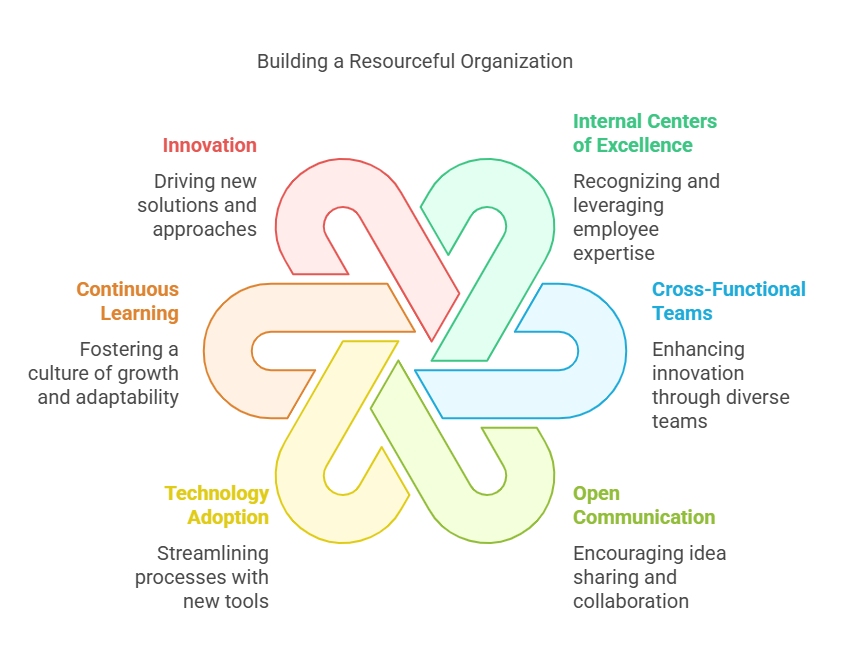Skills 101: What Is Resourcefulness Really?
Resourcefulness is a valuable skill that everyone can benefit from mastering. It’s the ability to find creative and effective solutions to challenges or problems. This can involve making the most of limited resources or finding innovative ways to overcome obstacles. In both personal and professional life, resourcefulness is a valuable tool.
In this article, we’ll explore what resourcefulness entails and how it can enhance your problem-solving abilities.
Defining Resourcefulness in Practice
Resourcefulness means finding clever and proactive ways to overcome difficulties and optimize resources. For instance, a company facing budget constraints can save costs by streamlining operations and leveraging existing skills.
Resourcefulness involves patience, creativity, networking, initiative, confidence, and continuous learning. These traits help individuals and teams adapt to change and find innovative solutions.
Challenges to resourcefulness include limited access to resources, resistance to change, and fear of failure. Overcoming these challenges requires a proactive mindset, embracing new technology, and embedding resourcefulness in organizational culture.
The Art of Being Resourceful in Work and Life

Individuals can encourage a culture of resourcefulness in their organization in a few ways:
- Embed resourcefulness into the organizational culture.
- Leverage existing skills.
- Streamline operations.
- Adopt new technology.
These strategies help optimize resource levels, leading to enhanced organizational success. Real-world examples of resourcefulness include finding clever ways to overcome difficulties, being seen as an innovator, and gaining a competitive edge.
Employers highly value resourcefulness. They appreciate patience, networking, creativity, initiative, confidence, and continuous learning. Resourceful individuals add value to the organization, increasing productivity and overall success.
Real-World Illustrations of Resourcefulness

Individuals can show resourcefulness in real-world situations by using their existing skills, streamlining operations, and embracing new technology. This applies to both personal and professional lives. For instance, effective time management, creative problem-solving, and the ability to adapt to change are practical examples of resourcefulness. Entrepreneurs starting a business with limited resources or companies optimizing processes for efficiency are real-life examples.
Resourceful Individuals vs. Well-Resourced Teams: A Comparison
Resourceful individuals and well-resourced teams have different problem-solving approaches. Resourceful individuals rely on creativity, ingenuity, and perseverance to overcome challenges, often making the most of limited resources. Well-resourced teams may have more access to technology, funding, and manpower to address problems efficiently.
The advantage of being resourceful lies in the ability to think outside the box, adapt to changing situations, and take calculated risks. However, resourceful individuals may struggle with the lack of support and resources. Well-resourced teams have the advantage of ample resources but may become complacent and less innovative.
For organizations to maximize success, they must balance resourceful individuals and well-resourced teams. Resourceful individuals can bring fresh perspectives, innovation, and flexibility to a team, while well-resourced teams provide stability and efficiency. Organizations can effectively leverage both types of talent by fostering a culture that values resourcefulness and encourages creative problem-solving. This can include creating opportunities for resourceful individuals to share their ideas and empowering well-resourced teams to adapt and innovate.
The Myths of Scaling and Team Growth

Common myths about scaling and team growth should be debunked. One myth is that more resources lead to automatic success, and another is that a larger team is always more effective.
Organizations can support scaling and team growth by building a culture of resourcefulness. This can be achieved by embedding resourcefulness in the organizational culture, leveraging existing skills, streamlining operations, and adopting new technology.
By doing so, they can optimize resources and more effectively adapt to changing market conditions. It is also a misconception that success is solely based on the size of the team or the amount of resources available.
In reality, being resourceful allows teams to find innovative solutions and be more competitive. It also helps teams be perceived as innovators, which is critical for success in today’s economy.
Cultivating a Culture of Resourcefulness in Your Organization
Injecting Resourcefulness Into Organizational DNA
Organizations can identify and exploit internal centers of excellence by recognizing and leveraging its employees’ unique skills and expertise. Encouraging collaboration and cross-departmental teamwork can tap into the workforce’s diverse knowledge base and innovative thinking. This can lead to new solutions, processes, and products that enhance the organization’s resourcefulness.
To eradicate organizational silos and foster better knowledge-sharing, an organization can implement open communication channels, knowledge-sharing platforms, and collaborative project management tools. Breaking down barriers between different departments and encouraging the free flow of information can create an environment where employees are more likely to share ideas, learn from each other, and collectively solve problems in a resourceful manner.
New technologies can enhance resourcefulness within an organization by automating repetitive tasks, streamlining processes, and providing real-time access to data and information. Embracing technology can increase productivity, adapt to changing market conditions more effectively, and empower employees to make informed decisions based on accurate and up-to-date information. This can ultimately lead to a more resourceful and agile organization better equipped to respond to challenges and capitalize on opportunities in the market.
Spotting and Exploiting Internal Centers of Excellence
Organizations can identify and recognize their internal centers of excellence by encouraging open communication and collaboration. This allows employees to showcase their skills and expertise.
To achieve this, organizations can provide opportunities for employees to share their knowledge and ideas. This can be done through regular team meetings, workshops, and brainstorming sessions.
Additionally, organizations can leverage employees’ existing skills by assigning projects that align with their expertise, allowing them to contribute to their areas of strength.
Strategies like providing ongoing training and development opportunities can help the organization effectively exploit and leverage its expertise and skills. Promoting cross-functional teamwork and establishing mentorship programs can also be beneficial. Organizations can encourage employees to expand their skill sets and contribute to their growth and success by fostering a continuous learning and knowledge-sharing culture.
Promoting a proactive approach to problem-solving and decision-making can foster a culture of resourcefulness within the organization. Recognizing and rewarding innovative solutions and ideas and allowing employees to explore new approaches and methods can also be helpful.
Additionally, organizations can encourage knowledge sharing and idea generation by creating platforms for employees to collaborate and exchange insights, fostering a culture of innovation and adaptability.
Inventory of Skills: Knowing Your Team’s True Capabilities
One way to assess a team’s abilities is by conducting skills assessments and proficiency tests. This helps to understand their knowledge and expertise. Getting feedback from peers, managers, and clients can also offer helpful insights into team members’ strengths and areas for improvement.
The team’s track record and past achievements can give a clear picture of their capabilities.
Leaders can create an open and supportive environment that values honesty and self-reflection. This can encourage team members to evaluate their skills accurately. Regular feedback and performance reviews can help team members assess their skills objectively.
Setting clear expectations for skill development and providing training programs can motivate employees to assess their abilities and work on improvement.
Leaders can maintain an updated inventory of skills by implementing regular skills audits, tracking professional development activities, and promoting a culture of continuous learning. Encouraging team members to update their skills profiles and assessments regularly and incorporating new tools and technologies for skill assessment can help ensure an accurate inventory of team capabilities.
Operational Insight: A Deep Dive into Efficiency
Organizations can inject resourcefulness into their organizational DNA by embedding it in their culture. They can leverage existing skills, streamline operations, and adopt new technology.
By promoting a proactive strategy to optimize resource levels for scaling, organizations can encourage employees to find clever ways to overcome difficulties, increasing efficiency.
Identifying and exploiting internal centers of excellence for operational insight and efficiency involves recognizing areas of expertise within the organization and leveraging them to streamline processes and improve productivity.
New technologies can be leveraged as a force multiplier to improve operational efficiency. This can be done by automating repetitive tasks, enhancing communication and collaboration, and providing data-driven insights for informed decision-making.
Cross-pollinating Expertise with Cross-Functional Teams
Cross-functional teams benefit from sharing expertise within the organization. This leads to more innovative problem-solving and enhanced creativity. For example, a marketing specialist sharing knowledge with software engineers can lead to more user-friendly and impactful digital products.
Organizations can create open communication channels to encourage knowledge sharing, host regular cross-departmental meetings or workshops, and incentivize employees to share their expertise. Cultivating a culture that promotes expertise cross-pollination among cross-functional teams by fostering a sense of shared purpose and mutual respect, celebrating cross-departmental successes, and providing opportunities for interdisciplinary projects is also essential.
By creating an environment where different areas of expertise are valued and integrated, organizations can maximize the potential of their cross-functional teams and drive more significant innovation and productivity.
Fostering a Workplace Conducive to Innovation
Companies can encourage open communication, collaboration, and risk-taking to create an innovative workplace. This helps employees feel empowered to share ideas and try new approaches, fostering creativity.
Strategies like cross-functional team projects, mentorship programs, and regular brainstorming sessions can break down silos and facilitate knowledge sharing, leading to more significant innovation.
New technologies like project management tools, collaboration platforms, and data analytics software can also enhance and multiply innovative efforts. These tools can streamline processes, provide insights, and help employees work more efficiently, ultimately driving innovation and growth.
Eradicating Organizational Silos for Better Knowledge Sharing
Organizations can improve knowledge sharing by fostering a culture of resourcefulness. Encouraging employees to find clever ways to overcome difficulties can break down silos and promote collaboration. Strategies like leveraging existing skills, streamlining operations, and adopting new technology can improve knowledge sharing. Technologies like project management software, communication tools, and collaboration platforms are crucial in facilitating cross-departmental collaboration.
Focusing on resourcefulness leads to innovative solutions, effective knowledge sharing, and improved productivity.
Leveraging New Technologies as a Force Multiplier
New technologies can help organizations in many ways. For example, they can automate repetitive tasks so employees can focus on more complex and creative work.
For example, artificial intelligence and machine learning can improve data analysis and decision-making. Cloud computing also allows remote collaboration and real-time access to information, creating a flexible work environment.
Organizations must provide employees with training and tools to try new solutions and adapt to changes to make the most of new technologies. By embracing digital transformation and using new technologies, organizations can help their workforce devise unique ways to use resources best, leading to sustainable growth and success.
Harnessing Opportunities: The Ready Stance
Teams and individuals can develop a resourceful culture within their organization by integrating it into the organizational culture and using existing skills. They can also streamline operations and adopt new technology. Practical strategies for building resourcefulness into an organization’s ethos include finding intelligent ways to overcome challenges, optimizing resource levels for growth, and being proactive.
Individuals and teams can demonstrate patience, network, showcase creativity, take initiative, have confidence, and engage in continuous learning to enhance their resourcefulness. The blog highlights these qualities. It also offers examples of how job seekers can show resourcefulness on their resumes and emphasizes the workplace benefits, such as being seen as innovators and more competitive.
Why Resourcefulness Tops The List For Employers
Resourcefulness is highly valued in the workplace. It helps solve problems, adapt to changes, and maximize available resources. For instance, a resourceful employee might find new ways to streamline operations, cut costs, and boost efficiency, benefiting the company’s bottom line.
Resourceful individuals often show key qualities like patience, creativity, initiative, and a commitment to continuous learning. These qualities are essential for handling complex and changing work environments.
Employers can recognize and encourage resourcefulness by making it part of the company culture, offering skill-building opportunities, and promoting a proactive approach to problem-solving. By valuing and nurturing resourcefulness, employers can develop a more adaptable, innovative, and competitive workforce.
Examining Resourcefulness During Interviews
Being resourceful in a job interview means finding creative solutions to problems. It involves thinking creatively, adapting to unexpected situations, and using available resources best to achieve goals.
For instance, a candidate can show resourcefulness by sharing when they solve a project setback using alternative methods or teamwork. Resourcefulness can be developed at work through continuous learning, fostering innovation, promoting open communication, and encouraging an entrepreneurial mindset.
Doing this can lead to better problem-solving and adaptability, as well as increased productivity in the workplace.
Crafting the Ultimate ‘Resourcefulness Section’ in Your Resume
People can show they are resourceful in work and life by using creative problem-solving, thinking outside the box, and finding innovative solutions to challenges. For instance, a professional who sees a cost-effective way to streamline operations or improve efficiency showcases resourcefulness. To refine their ability to be resourceful for their resumes, individuals can highlight specific achievements that showcase their resourcefulness.
This can include implementing a new process that saves time and resources or finding alternative solutions to meet a deadline with limited resources.
Additionally, individuals can demonstrate their resourcefulness by being willing to take on new challenges, being adaptable, and continuously seeking opportunities for growth and learning.
Refining Your Ability to be Resourceful
Individuals can develop resourcefulness through strategies such as patience, networking, creativity, initiative, confidence, and continuous learning. These traits help them seek solutions and optimize resources to overcome difficulties.
Organizations can cultivate a resourceful culture by embedding it in their organizational culture, leveraging existing skills, streamlining operations, and adopting new technology.
Encouraging employees to develop resourcefulness can be done through training, incentives, and recognizing resourceful behaviors.
Spotting and exploiting internal centers of excellence within a team or organization can be achieved through collaboration, identifying expertise, and encouraging knowledge sharing and innovation.
These practical strategies help individuals and organizations refine their resourcefulness in both work and life.
Common Questions About Developing Resourcefulness Skills
Practical strategies for developing resourcefulness skills are:
- Optimize existing resources.
- Find creative solutions to challenges.
- Learn to adapt and innovate in various situations.
Individuals and teams can cultivate a culture of resourcefulness within their organization by:
- Embedding it into their organizational culture.
- Leveraging existing skills.
- Streamlining operations.
- Adopting new technology.
Common misconceptions about scaling and team growth concerning resourcefulness include:
- The belief is that more resources automatically lead to success.
- Resourcefulness allows for more efficient use of available resources and can lead to greater competitiveness and innovation.

Vizologi is a revolutionary AI-generated business strategy tool that offers its users access to advanced features to create and refine start-up ideas quickly.
It generates limitless business ideas, gains insights on markets and competitors, and automates business plan creation.



